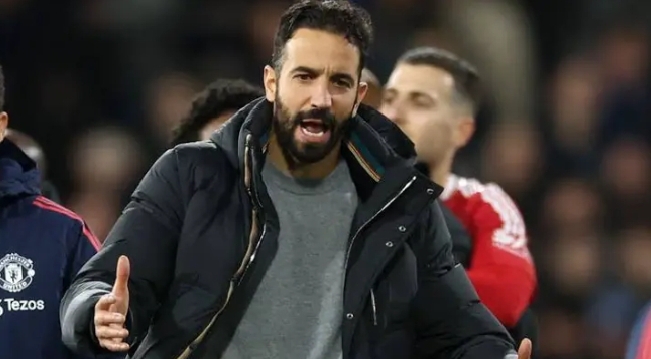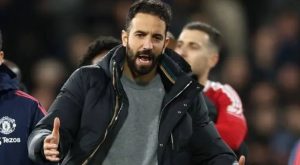
“How Ruben Amorim is Dealing with the Same Problem Erik ten Hag Solved at Manchester United”
How Ruben Amorim is Dealing with the Same Problem Erik ten Hag Solved at Manchester United
In the swirling drama that has surrounded Manchester United since Sir Alex Ferguson’s retirement, managerial change has been a recurring theme. With each new coach came new problems, philosophies, and expectations. When Erik ten Hag arrived from Ajax in 2022, he walked into a fractured dressing room, inconsistent performances, and a lack of identity on the pitch. His first major challenge? Rebuilding the culture and restoring discipline—two pillars of any successful football institution.
Fast forward to 2025. Ten Hag’s reign is over, and in his place stands Ruben Amorim, the highly regarded Portuguese tactician, formerly of Sporting CP. Amorim brings with him a bold philosophy and a youthful, modern outlook on football. But despite the fresh start, one thing remains constant: he’s facing the very same problem Erik ten Hag once tackled—restoring identity, discipline, and a winning culture at Manchester United.
Let’s explore how Amorim is dealing with these challenges, how his approach compares to Ten Hag’s, and why the weight of expectation at Old Trafford never truly changes.
—
The Problem: A Club Without a Clear Identity
When Ten Hag took over, Manchester United were struggling with a bloated squad, divided leadership, and a tactical void. Players often lacked clarity in their roles, and post-Ronaldo tensions only magnified instability. The Dutchman’s first task was not tactical—it was cultural. He needed to set standards, earn respect, and regain control of the dressing room.
Ten Hag responded by enforcing rules: strict timekeeping, training ground discipline, and a no-nonsense stance on dissent. Cristiano Ronaldo’s public fallout, Jadon Sancho’s exile, and Harry Maguire’s demotion were not just decisions—they were statements. He re-established authority and insisted that the team came before individuals.
Ruben Amorim, arriving in 2024, now faces echoes of that same dysfunction. Despite a promising core of young players, the post-Ten Hag squad still suffers from inconsistency, lack of leadership, and lingering internal divisions—especially with new ownership changes and operational control under INEOS.
—
Amorim’s First Steps: Structure, Silence, and a Clean Slate
Where Ten Hag approached the crisis with bold public decisions, Ruben Amorim has adopted a more measured and internal approach.
1. Internal Reset, Not External Drama
Unlike Ten Hag, who often made disciplinary actions public (such as dropping Ronaldo or benching Rashford for being late), Amorim has so far kept disciplinary matters in-house. Reports suggest he’s working closely with key staff and leadership figures behind closed doors, preferring resolution over headlines.
2. Tactical Structure First
Amorim believes structure breeds discipline. His 3-4-3 system, honed at Sporting, is being introduced gradually. Early signs show improved organization without the ball and more intelligent pressing. Players are expected to adhere to positional discipline—those who don’t are quietly dropped, as seen in the reduced involvement of certain inconsistent wingers.
3. New Hierarchy
Where Ten Hag initially leaned on experienced figures like Bruno Fernandes and David De Gea, Amorim is reshaping the squad’s leadership dynamic, placing more responsibility on emerging stars like Kobbie Mainoo and Lisandro Martínez. He’s encouraging meritocracy over seniority—a hallmark of his Sporting days.
—
Ten Hag’s Legacy: Foundations Amorim Can Build On
While Ten Hag’s tenure had its ups and downs, his greatest contribution was arguably off the pitch. He:
Introduced discipline after a freewheeling, player-led culture.
Established a playing style—possession-based, controlled buildup—even if inconsistently executed.
Promoted youth, with Alejandro Garnacho, Kobbie Mainoo, and others breaking through.
Amorim inherits these foundations, but where Ten Hag struggled to evolve them into a consistent title-contending formula, Amorim is looking to embed his tactical identity more deeply and build a more flexible squad ethos.
—
Amorim’s Challenges: Same Battle, New Era
While Amorim is dealing with the same core issue—a lack of unity and clarity—he’s facing a different context:
1. Multi-Club Ownership Tensions
INEOS’s involvement brings added complexity. With shared ownership interests in OGC Nice, Amorim must manage not only footballing matters but also political pressures that could impact squad planning and European eligibility.
2. The Social Media Generation
Ten Hag dealt with locker room egos, but Amorim faces a more socially connected squad, where every move becomes public debate. His challenge is to command authority quietly, without escalating tensions into tabloid fuel.
3. Press Expectations Post-Rebuild
Ten Hag was given a grace period to rebuild. Amorim, by contrast, inherits a squad that fans expect to challenge now. The emotional patience once extended is shorter—especially if Liverpool, City, or Arsenal pull away early next season.
—
Key Differences in Approach
Though Amorim and Ten Hag are both tactical purists with a reputation for discipline, they differ in significant ways:
Amorim is far less confrontational, focusing instead on education over enforcement. Where Ten Hag issued ultimatums, Amorim is trying to win minds before reshaping behavior.
—
Success Metrics: What Will Define Amorim’s Progress?
For all his tactical nuance, Amorim’s success at United will be judged on familiar grounds:
Champions League qualification
Style of play: Does United look modern, dynamic, and fearless?
Squad unity: Are players aligned, or divided?
Youth development: Are players like Mainoo, Garnacho, and Amad thriving?
So far, Amorim has managed to steady the ship. His early Europa League performances show a team with renewed purpose. Training sessions are reportedly more intense but also more technical, with players engaging more tactically than in the final months under Ten Hag.
—
Conclusion: A New Chapter in the Same Story
In many ways, Ruben Amorim is not rewriting the Manchester United story—he’s continuing it. The problems Ten Hag solved—culture, discipline, tactical coherence—have not gone away; they’ve simply evolved with time. Amorim is now tackling them with his own tools: clarity, patience, and modern football intelligence.
Whether this approach will bear greater fruit remains to be seen. But one thing is certain: at Manchester United, the challenge is never just football. It’s identity, expectation, and legacy. Amorim, like Ten Hag before him, is learning that managing this club is about far more than 90 minutes on t
he pitch.
—
Would you like a shorter version for social media captions or a graphic-friendly summary?

Leave a Reply